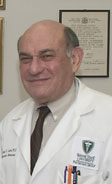
Dr. Sobel and his colleagues at several other centers across the country first treated study patients with three doses of fluconazole, an anti-fungal drug known commercially as Diflucan, over 72 hours to induce remission. The 387 patients were then randomly assigned to receive weekly treatment with either a 150 milligram dose of fluconazole or a placebo.
Weekly treatment with fluconazole was effective in preventing symptomatic yeast infections. Those taking fluconazole who remained disease-free at six, nine and 12 months included 90.8 percent, 73.2 percent and 42.9 percent, respectively, of the group. Comparatively, the proportion of those taking placebos who remained disease-free were 35.9 percent at six months, 27.8 percent at nine months and 21.9 percent at one year.
"Recurrent candida vaginitis, a common and poorly managed condition, can be successfully and safely controlled by weekly suppressive therapy with fluconazole," Dr. Sobel wrote in the article. "A long-term cure, however, remains elusive."
This marks the first time a safe, convenient treatment regimen has been articulated for recurrent vulvovaginal candidiasis. Dr. Sobel stated that further work must be conducted to determine the safety and efficacy of fluconazole for women who use it for prolonged periods of time.